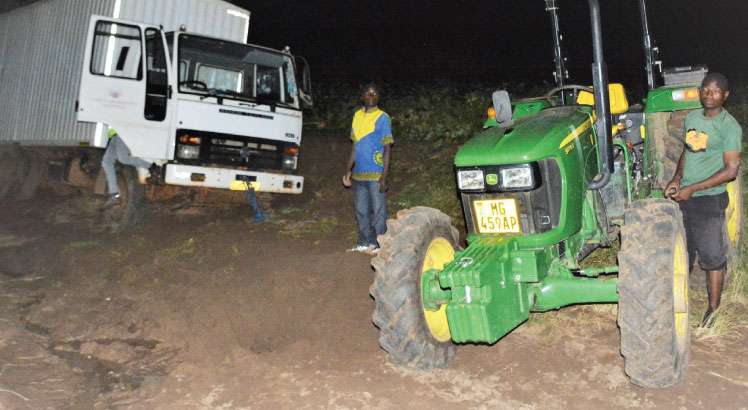Donkey work of delivering drugs
On a sunny Friday morning, anticipation fills communities around Thumbwe Health Centre in Chiradzulu District.
At the close of a tragic Cyclone Freddy, the community expects the Central Medical Stores Trust (CMST) to deliver essential drugs and medical supplies by any means.
Some villagers have lost prescribed medicines to the devastating floods and others have gone days without access to medical care due to impassable earth roads to the nearest clinics.
Kilometres away from the public health facility, the long-awaited delivery van steadily slithers its way up and down the broken, muddy road.
The team in the van has all reasons to try their best and deliver the consignments to Thumbwe and surrounding health facilities by close of business.
After a busy day, the van arrives at the rural health centre in Traditional Authority Kadewere.
Phales Yuda Shumba, a community volunteer who verifies drugs and medical supplies at the health centre, sighs with relief as the health centre is a matter of life or death for over 42 000 people in 69 surrounding villages.

The facility offers outpatient, maternity and anti-retroviral services as well as cholera treatment.
For days, most patients have been cut off from this and other facilities, denied accesss to vital medical attention amid rising demand for health care due to injuries and other conditions worsened by the rainstorm, floods and mudslides.
“Some people here have lost vital life-saving medicines such as antibiotics or malaria doses that demand strict adherence. They need to quickly replenish them,” Shumba says, quickly verifying and signing off delivery notes.
As soon as the job is done for Thumbwe, the van speeds off to the next stop: Namitambo Health Centre, about half an hour away.
As the usual route is no longer passable, the most recommended alternative, with steep and gorged-out roadsides, takes the crew many kilometres longer through Traditional Authority Mpunga.
Upon reaching Misewu Folo, a four-road filter to Mayera, Malowa, Thumbwe and Namitambo, the wet terrain gets worse as the van’s tyres stick deep in mud.
Supported by willing villagers, the delivery crew rolls their sleeves up, ready to do the dirty work that would take all day with no handy solutions.
Meanwhile, Namitambo and surrounding communities are waiting for the vital drugs and medical supplies.
A tractor hired from Mikolongwe, over 10 kilometres away, arrives, the situation proves trickier than the horsepower the farm machinery brings.
Trapped in drenched clay, the delivery van will require hours of digging to move on. Meanwhile, the clock is ticking and the sun retires into the yellow skies.
For this day, Namitambo has to do without the scheduled delivery.
According to CMST director of pharmaceutical operations Geoffrey Ngwira, this has been a widely familiar experience this year. Around the same time, elsewhere on Mangochi’s routes to Makanjira, Makanga and Lulanga health facilities, the roads and bridges were battered so hard that the public trust had to deliver medicine by boat.
In the central district of Lilongwe, outside the region hit by the longest-lasting cyclone, heavy rains also ruined routes.
A delivery van stuck in Mitundu on its way to Maluwa Health Centre, T/A Chadza, testifies to the hardship the delivery teams face in hard-to-reach areas.
In the Northern Region, the tricky terrains include Kameme and Nthalire in Chitipa.
Ngwira says the monthly distributions constitute an unforgiving task requiring enormous resources and expertise as the last mile distribution to facilities must conform to expectations despite any challenges.
In the 2022/23 fiscal year, marked with the most devastating cholera outbreak and two cyclones, CMST vans clocked 281 616 kilometres to deliver life-saving supplies nationwide, including in rural areas where 84 in every 100 Malawians live.
The cargo included 13 198 cubic metres of the public trust’s essential drugs and medical supplies as well as 2 375 cubic metres of nutritional commodities from development partners. This represents a monthly average of 1 100 cubic metres for essential medicines and 216 cubic metres for nutritional items.
CMST relies on its staff and vehicles for deliveries from its national pharmaceutical warehouse to regional medical stores in the North, Centre and South as well as from here to central hospitals.
Currently, CMST has outsourced the last mile distribution from regional stores to the 29 district hospitals and over 500 health facilities.
The third-party distributor, Cargo Management Logistics (CML), has to conform to CMST distribution plan, an important yardstick.
In terms of this performance indicator, the service provider scored an average of 93 percent for 2022/23, against the 92% for the previous year.
The missed targets were mostly attributed to impassable roads, especially in the rainy season when the vans increasingly endure downtime on more time-consuming diversions or struck in mud.
In his 13 years of service, CML distribution clerk Yohane Muhariwa has been deployed to hard-to-reach areas in the Southern and Central regions.
Stuck in Chiradzulu, Muhariwa combs through the years and remembers hard encounters in vans, boats or via unconventional means such as oxcarts, trying to complete deliveries by all means.
But comparatively, he notes, this year’s cyclone presents the sternest test.
As he prepares for an unforeseen night at Misewu Folo, he explains: “It takes a lot more than one can imagine taking medicines and medical supplies to facilities.
“It is a job that requires empathy and selflessness. But this year, the challenge took us to the edge.”
For CMST, such are the realities of taking medicines and medical supplies to the deep corners of the country.
The author is the CMST public relations officer





